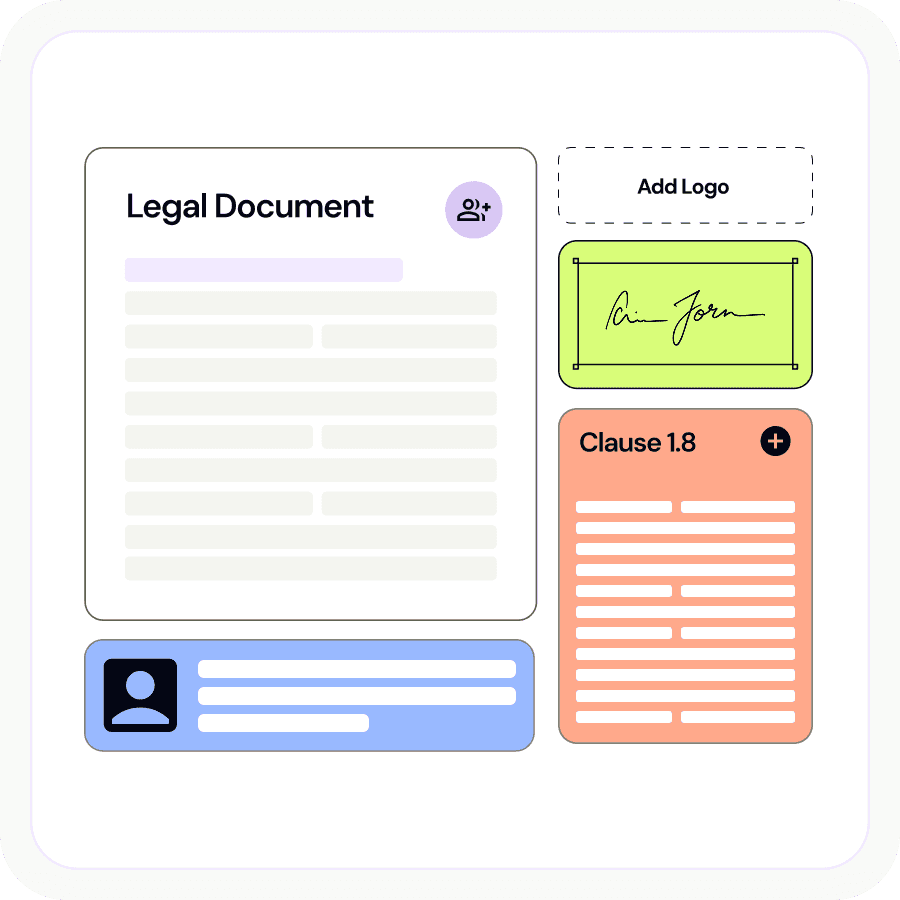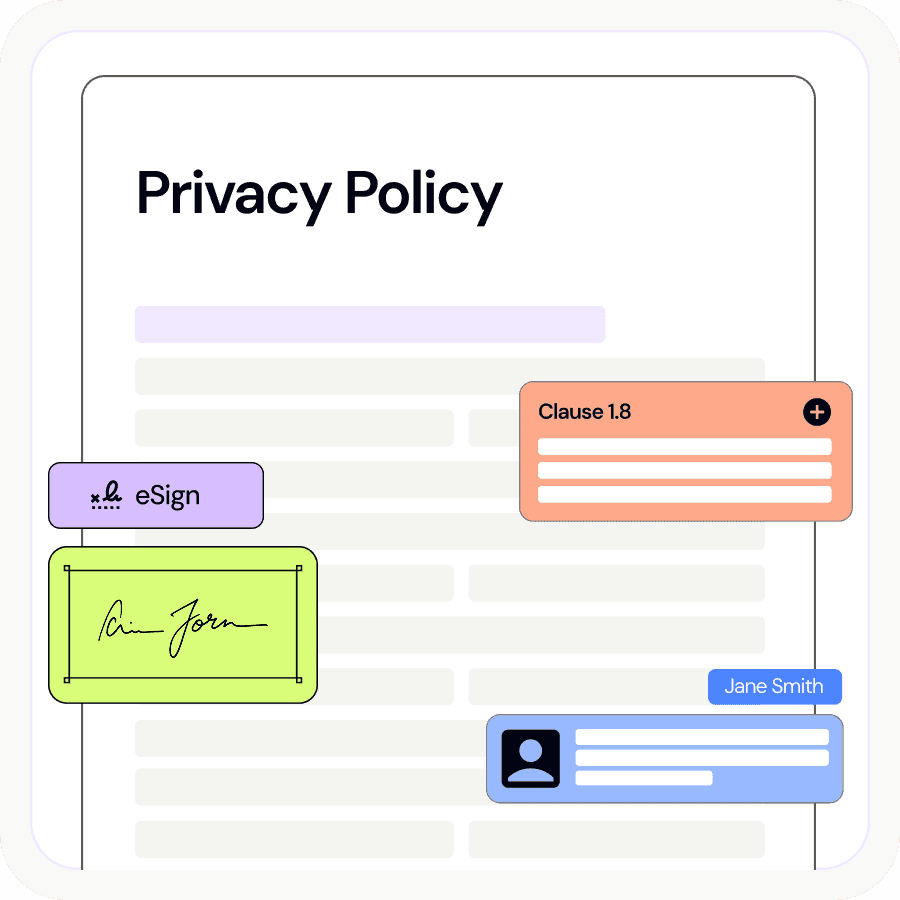With a range of IT policies available, it’s hard to decide which ones you truly need. Our latest guide is here to help.
In the rise of the internet era, keeping your business protected has become increasingly important.
Most small businesses, like yourself, use a range of information technology resources, commonly known as IT resources.
Think about it — does your business use computers, mobile phones, emails….the internet.
If you do, then you’re using IT.
In fact, over 95% of all Australian businesses used some form of IT. With the recent pandemic, it can only be assumed this figure has crept up.
However, as more and more businesses use IT resources, the risk of a data breach is always a present threat. Between 2020-21, there were almost 1000 reported data breach incidents.
Unfortunately, with only 19.7% of businesses having suitable and strictly applied IT policies in place to deal with those breaches, many businesses can be left in the dumps. Don’t let your business be a part of that figure.
A data breach can be a business owner’s worst nightmare. We know that your business is one of your most valuable assets, so don’t leave it open to digital vulnerability. Get digitally protected now!
Our legal guide on common IT policies is here to help. We’ve shared everything we know about the most common IT policies for your business with top-tier templates thrown in for good measure.
Read along to see which applies to your small business.
What are IT policies?
There is no universally accepted IT policy definition, however, IT policies are sets of rules or guidelines that outline how employees can use your businesses IT resources.
IT policies can also set out how your business will respond to any breaches or non-compliance to its IT rules.
So, they have a dual function, they are a form of information and protection.
Great IT policies will explain exactly how your employees can use IT equipment, what they are allowed to do and what consequences may follow from their wrongful use of that equipment.
As a result, your IT policies are there to guide your employees on the acceptable practices and standards they must follow in your workplace. It’s almost like a rulebook.
Below, we go through the benefits and most common IT policies for small businesses.
Benefits of implementing IT policies
As mentioned above, a data breach can be a business owner’s worst nightmare. But there’s a simple solution — have the correct IT policies in place.
There are 3 major benefits to having IT policies in place, so let’s go through each benefit in a bit more detail.
1. Increased employee compliance
Of course, your IT policies will allow you to communicate your business expectations to your employees with clarity and ease. Because you can lay out the exact dos and don’ts of employee behaviour, your employee compliance levels are sure to increase.
After all, if your employees understand the rules you wish them to follow, they’re simply more likely to abide by them.
2. Limit the risk of data breaches
As IT breaches continue to rise, your first step to IT protection should come from your IT policies. However, the best form of business protection is prevention — and that’s exactly what your IT policies will work to do.
Therefore, you can think of your IT policies as a form of risk management. They will stand as a rulebook regarding what IT systems your business uses and will detail how employees must use them. As a result, you’re creating consistency across your business.
Essentially, if everyone in your business understands their roles and how to use your IT resources, then you’re already limiting the risk of an accidental breach.
3. Improve your businesses response plan
Now, IT policies for small businesses have a dual benefit. Not only do they limit the risk of breaches, as outlined above, but they can also help your business be as prepared as possible in the event something goes wrong.
In fact, your IT policies will allow your business to manage any sort of crisis more efficiently as you’ll have a set action plan in place. In effect, this can help make breaches a little less stressful as it’ll essentially take the guesswork out of figuring out what to do if a breach does occur.
Now that you know what IT policies are and their benefits, which ones do you need?
Find out below!
7 common IT policies your business needs
No matter the sort of small business you run, if you’re using IT you’ll need a few IT policies. But with so many different IT policies out there, it can get overwhelming to figure out which ones you truly need.
In the paragraphs below we give you a snapshot of not only the 7 most common IT policies but the most important ones.
We know that writing IT policies for your small business is probably the last thing on your mind. After all, running a business is a busy game. So, we’ve provided you with a template for each, as well as a general framework to help you get started.
1. IT Policy
Now, this is one of the most common IT policies and arguable, an extremely important one for your business.
At its core, the IT Policy outlines the standards that employees must abide by when using your businesses IT resources.
So, this policy gives your employees clear guidelines on your acceptable standards and expectations when it comes to IT resources within your business. It also outlines how the policy will be enforced and defines your businesses right to prevent or take action against your employees inappropriate IT usages.
As the IT Policy is very broad, you can lay down a range of employee rules regarding your businesses IT.
Most IT Policies will outline:
- Email usage
- Internet use
- Social media
- Mobile phone usage
- Use of business IT equipment
- Your businesses ability to monitor the use of technology
- Consequences for failing to abide by policy guidelines
Out of the range of common IT policies available, the classic IT Policy is a must.
Whether you have 2 employees or 100, an IT policy will provide your business with a basic level of IT protection.
Download a free sample of our IT Policy and check out our template below.
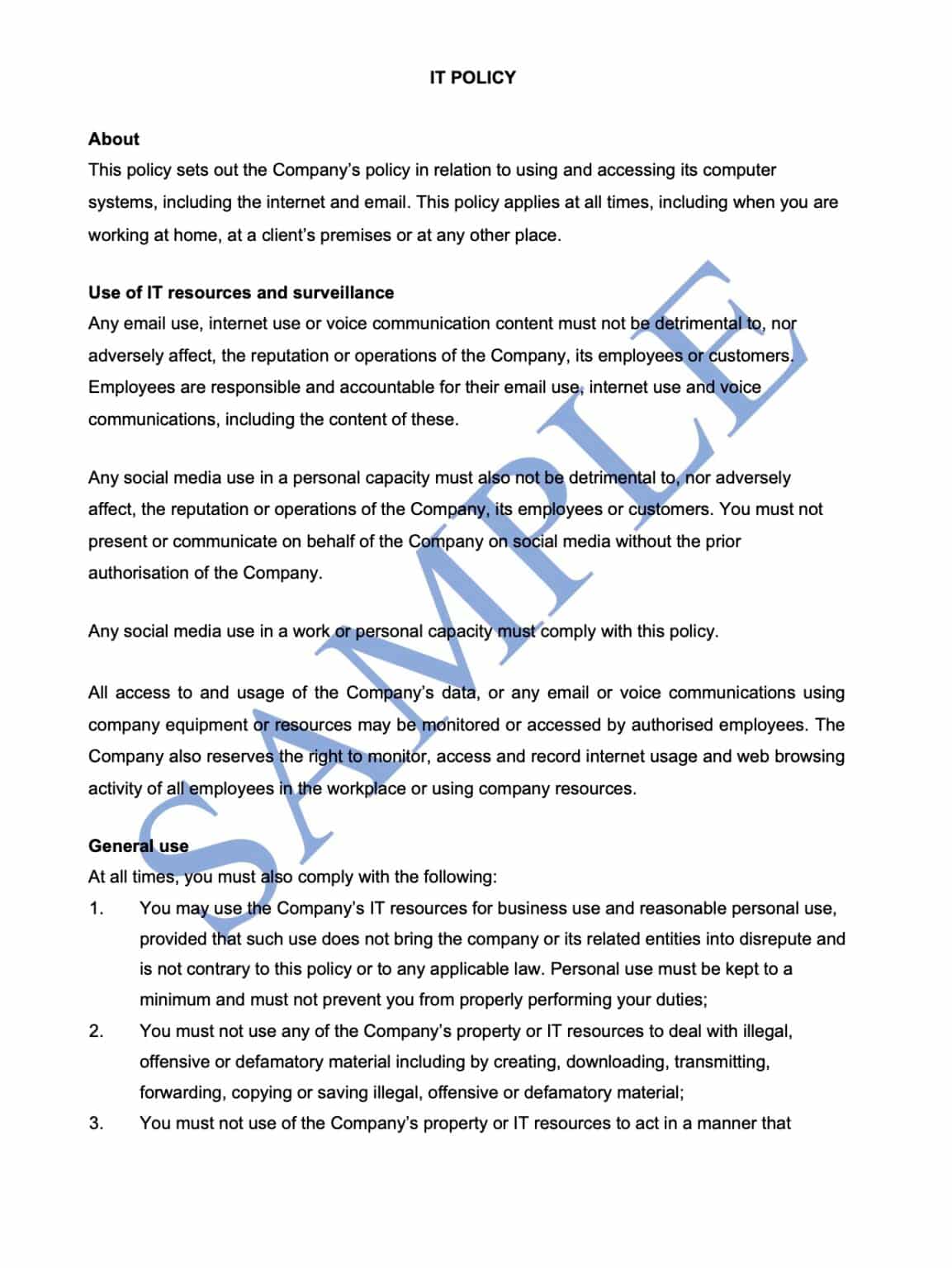

2. Privacy Policy
Privacy Policies are also extremely common IT policies most small businesses need.
The Privacy Policy is essential if your business collects, manages and uses online personal information from your customers.
This policy is heavily focused on business protection. Generally speaking, a Privacy Policy is a legally mandatory IT policy for most small businesses that collect personal information from their customers.
So, if your business does this, you’re legally required to be transparent about your IT practices, methods and uses.
Which small businesses does this legal requirement apply to? Small businesses with an annual turnover of more than $3 million. However, even if your small business doesn’t meet this $3 million turnover, it’s still best to protect your business by having a Privacy Policy in place.
Your businesses policy must cover:
- The type of personal information your business collects online
- How that personal information is used
- When it may be disclosed to third-party services, such as third-party websites
- When your customers can request access to their personal information
- How this personal information is stored and secured by your business
- Whether cookies or similar forms of technology are also being used
Now, if your customer base is only within Australia, then having a standard Privacy Policy will do the trick. You can download our free customisable Privacy Policy template.
However, if your business’s customer base extends beyond our Australian borders all the way to the European Union, you’ll also need a GDPR Privacy Policy in place.
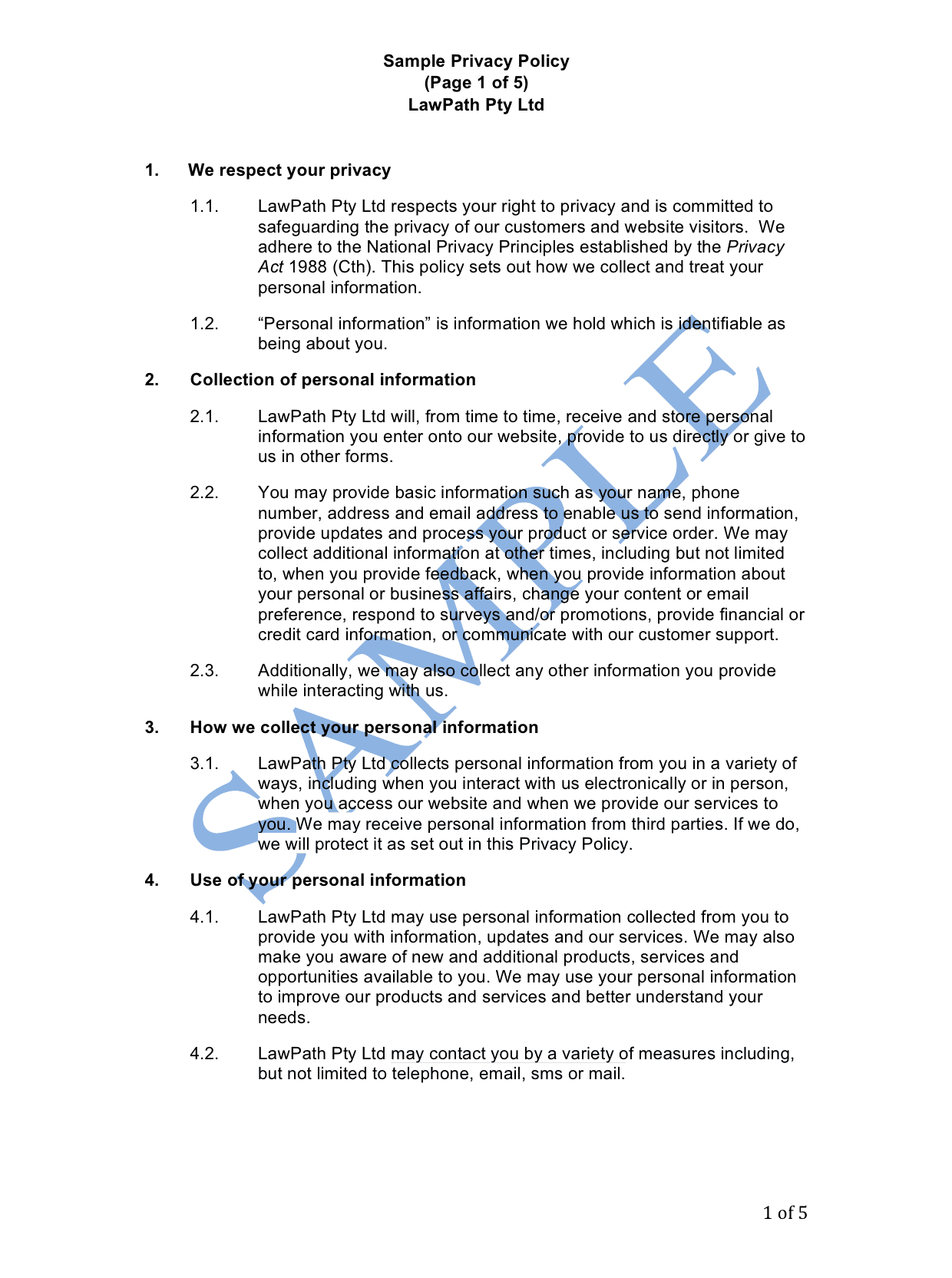

3. Acceptable Use Policy
As its name suggested, an Acceptable Use Policy defines what your business deems as acceptable and non-acceptable use of its IT resources.
This is another extremely common IT policy as it allows you to clearly explain your business expectations. This policy will allow you to rest assured that your employees are aware of their responsibility to use IT resources in a way that reflects your businesses values and morals.
However, as well as setting expectations, your Acceptable Use Policy can also set clear restrictions. Don’t want your employees to use their business email address for personal use? Put it in your Acceptable Use Policy.
Commonly, an Acceptable Use Policy will outline:
- What electronic communications can be used in the workplace
- How IT communications will be monitored
- What IT systems or data must remain confidential
- Forms of behaviour that are acceptable and non-acceptable
- Consequences for failing to abide by the policies guidelines.
So, if your business uses any IT resources, such as computers, headsets, databases, electronic communication such as emails or other messaging systems then this is the policy for you.
Also, if your business deals with any sort of confidential information, such as customer data, then having this policy in place should ensure your business is abiding by the appropriate legal standards.
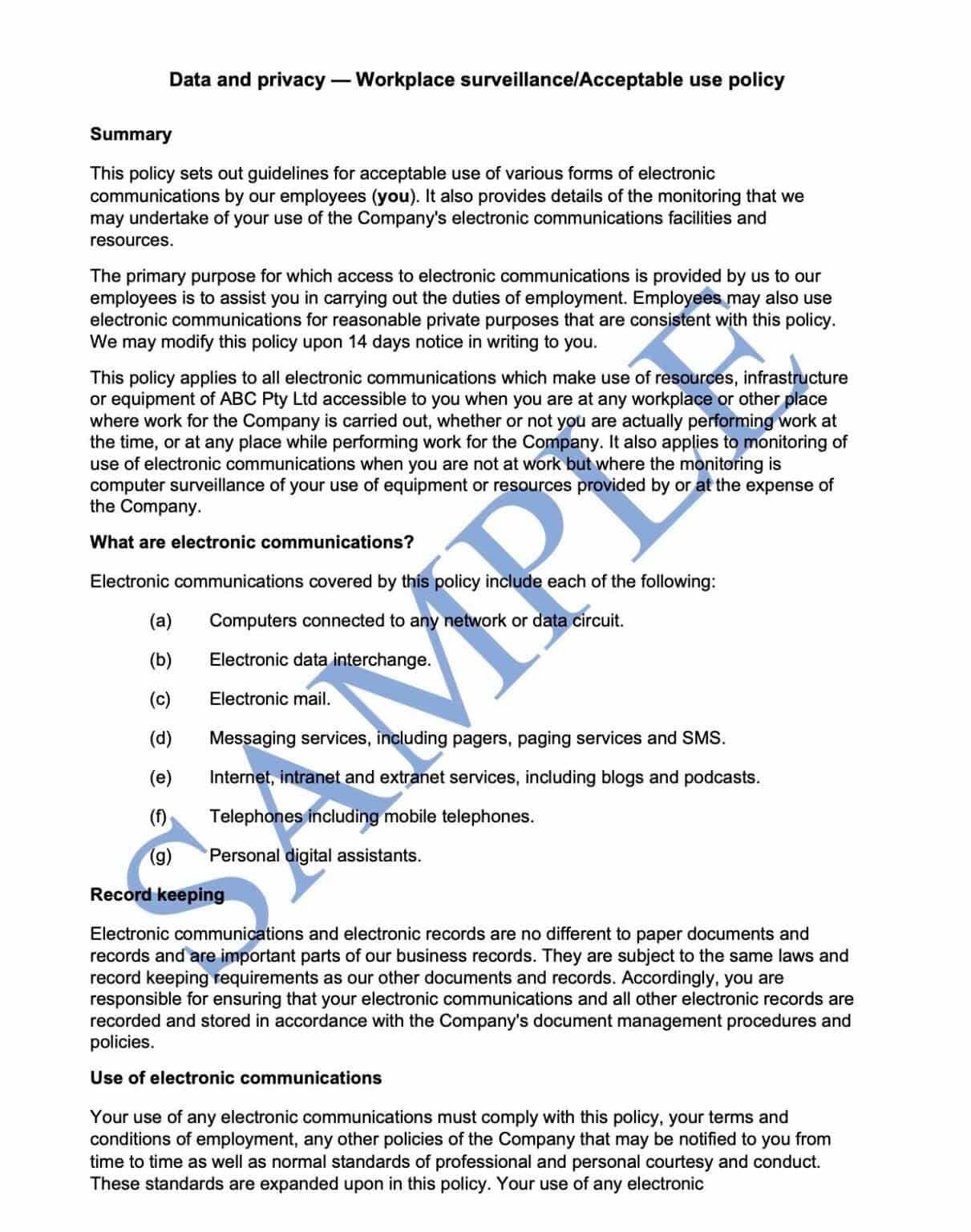

4. Security Policy (Cybersecurity)
A Security Policy (Cybersecurity) is another must-have on the list of common IT policies for any small business. Want a full-proof way to protect technology and information breaches within your business? Then this is the policy you’ve been searching for.
Generally speaking, your Security Policy (Cybersecurity) explains and clarifies what IT resources your small business uses, and how you’d like to protect them. It’s basically an IT management document as it tells your employees how to use the businesses IT resources in a secure and safe manner.
Your Security Policy (Cybersecurity) should include, at a minimum:
- Password requirements
- Email security practices
- Device security or computer security
- How data should be safety transferred
- Security
For example, if your business wants to ensure all employee passwords are secure from hackers, your Security Policy (Cybersecurity) may state that all passwords must be at least 8 characters long with at least 1 capital letter and 2 symbols.
Another example, regarding email security, may be that employees shouldn’t open junk, spam or scam emails on their work emails.
All in all, this policy will help your employees understand their role in protecting your businesses valuable information.
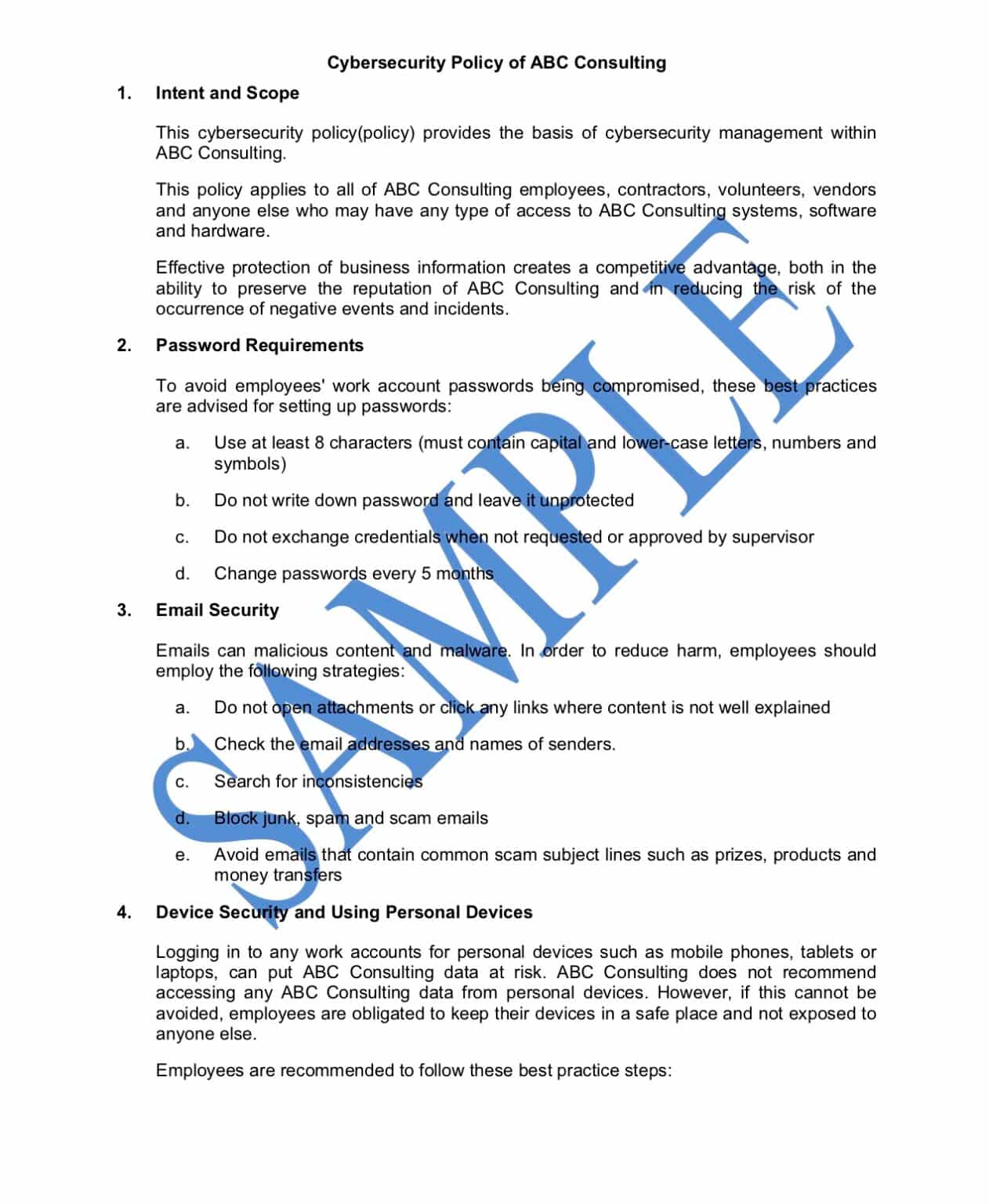

5. Data Breach Policy
If your business uses data or confidential information, the risk of a data breach occurring is always present. Data breaches can happen at the hand of hackers as well as your own employees, either deliberately or accidentally.
However, by having a Data Breach Policy in place your business will have a well thought out action plan to deal with any possible breaches — if they occur. Your action plan should include provisions regarding red flags to watch out for, what your employees need to do during a data breach and how to recoup when a breach happens.
The most popular elements you should place in your Data Breach Policy are:
- Tips for how to identify whether a suspected breach has occured
- Rules for notification of a breach
- Data breach response action plan
- Consequences of breaking policy rules or being the cause of the breach
It’s always better to be safe and have a Data Breach Policy in place, rather than regret not having it at a time you need it the most.
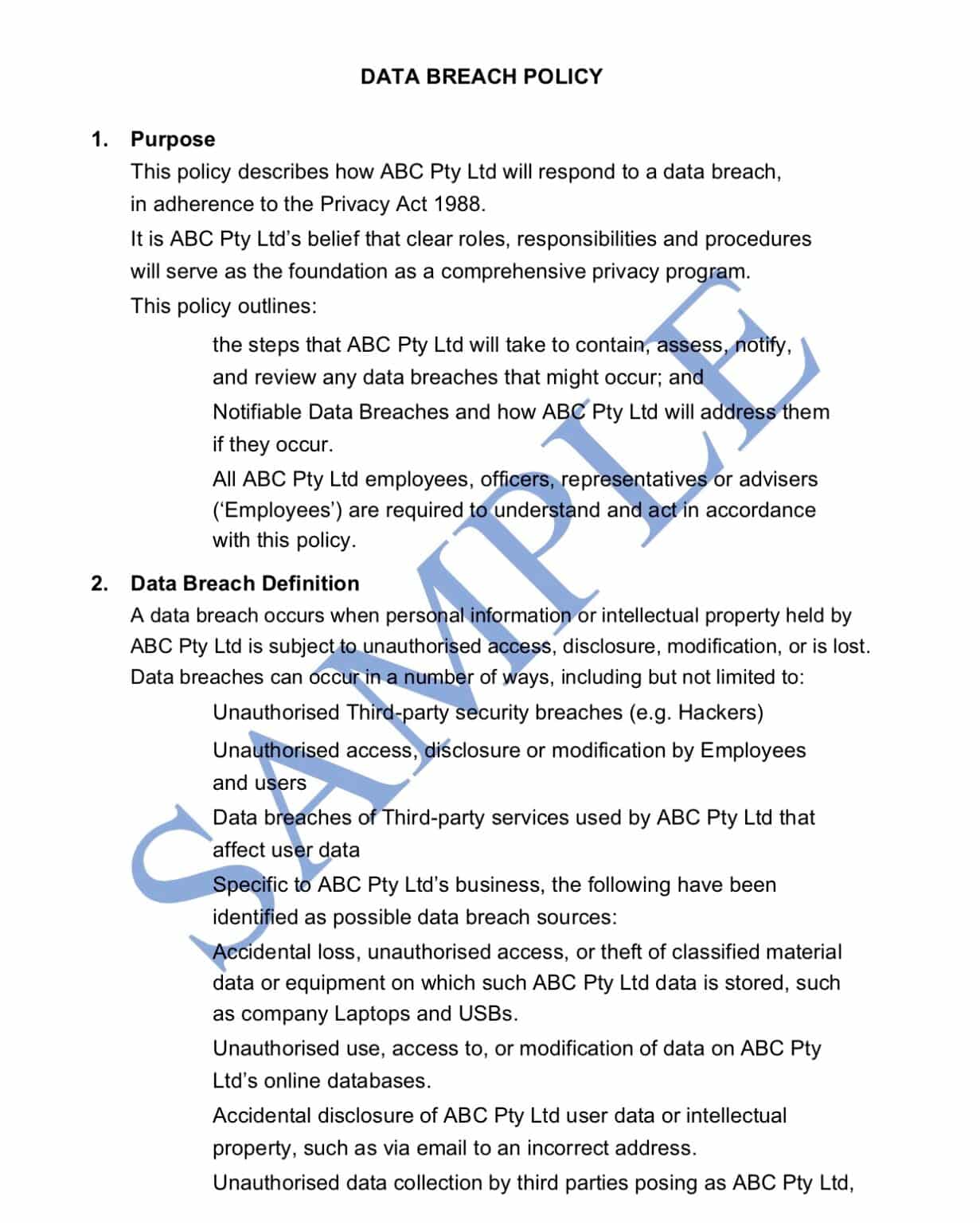

6. Social Media Policy
We all know that social media is an extremely powerful tool. In fact, 90% of small-to-medium-sized businesses use Facebook to engage with customers and promote their business. However, few have a proper Social Media Policy in place.
If your business doesn’t have a Social Media Policy, now is the time to get one ready.
Your Social Media Policy can outline your expectations on how your employees should properly behave on social media, both inside and outside of work hours. It can also set out rules for those who manage and operate your businesses social media accounts.
Do you find it inappropriate for your employees to rant about your business, their co-workers or even their boss, i.e. you? Sounds like a Social Media Policy may be for you.
In general, Social Media Policies will cover:
- What is appropriate and inappropriate use of social media
- Guidelines for employees regarding how they should identify themselves as business employees
- Rules or restrictions on social media usage during work hours
- Social media monitoring guidelines for a businesses social media activity
- Disciplinary action that may be taken when a breach of policy occurs
So, if you want to educate your employees and protect your business brand on many social media platforms, it’s best to have a Social Media Policy in place.
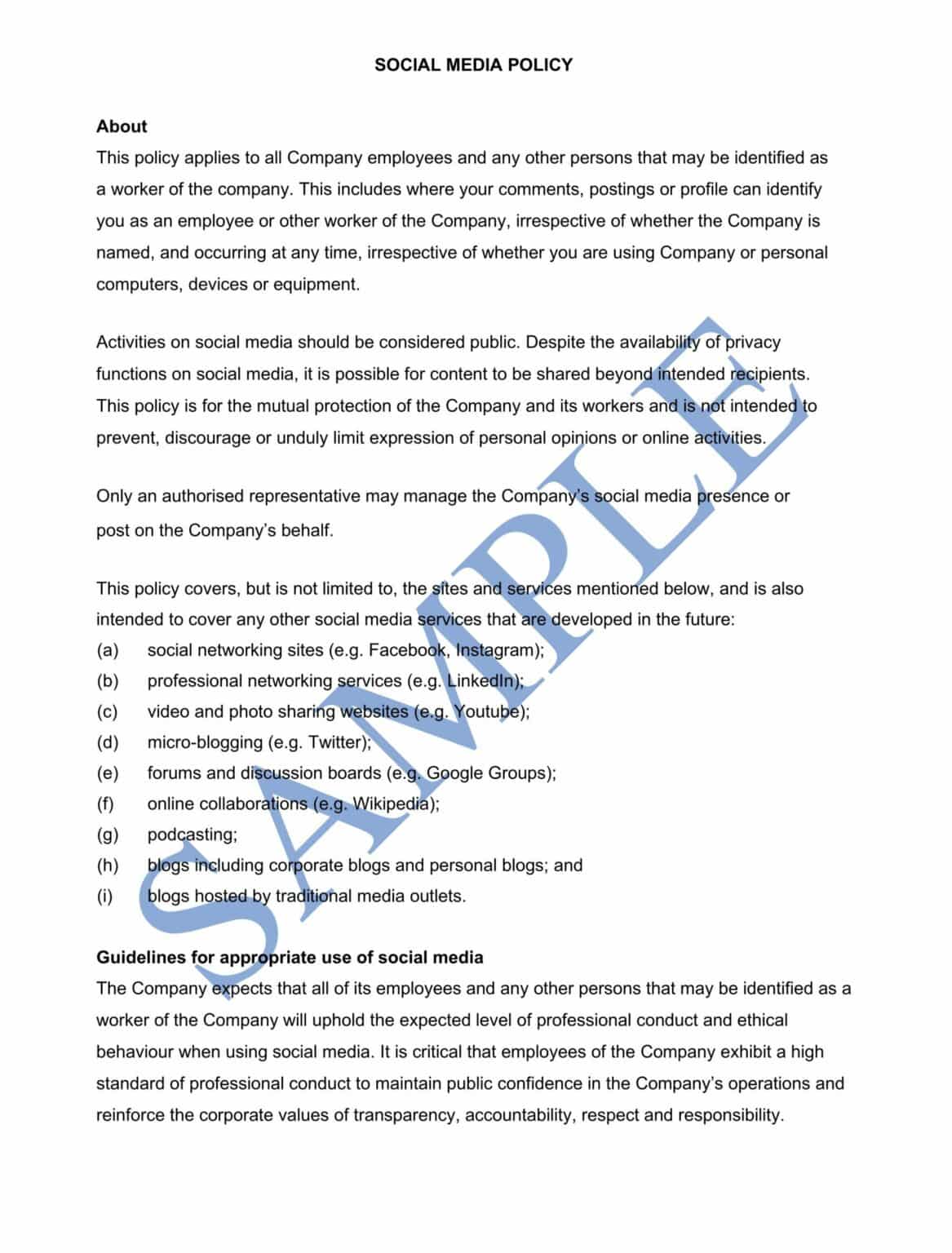

7. Working From Home Policy
In light of the recent pandemic, many businesses have employed permanent flexible working arrangements. If your business is offering employees the option to work from home, it’s imperative to have a Working From Home Policy in place, commonly known as a WFH Policy.
Common elements a Working From Home Policy will cover are:
- Eligibility: Will your employees need secure internet access? A laptop? Video conferencing capabilities?
- Requests to WFH: Who must be notified if an employee chooses to WFH?
- Employee expectations: What IT standards must be abided by including the use of business equipment, other IT resources, confidential information etc
- Technology support options: What support will your business provide? May include computers, laptops, headsets, licenses and much more
- Returning business IT resources: How, what and when should employees return business property and other IT resources
Your IT policy for work from home will outline when your employees can WFH, what IT equipment is needed and what business equipment or technological support will be provided for eligible employees.
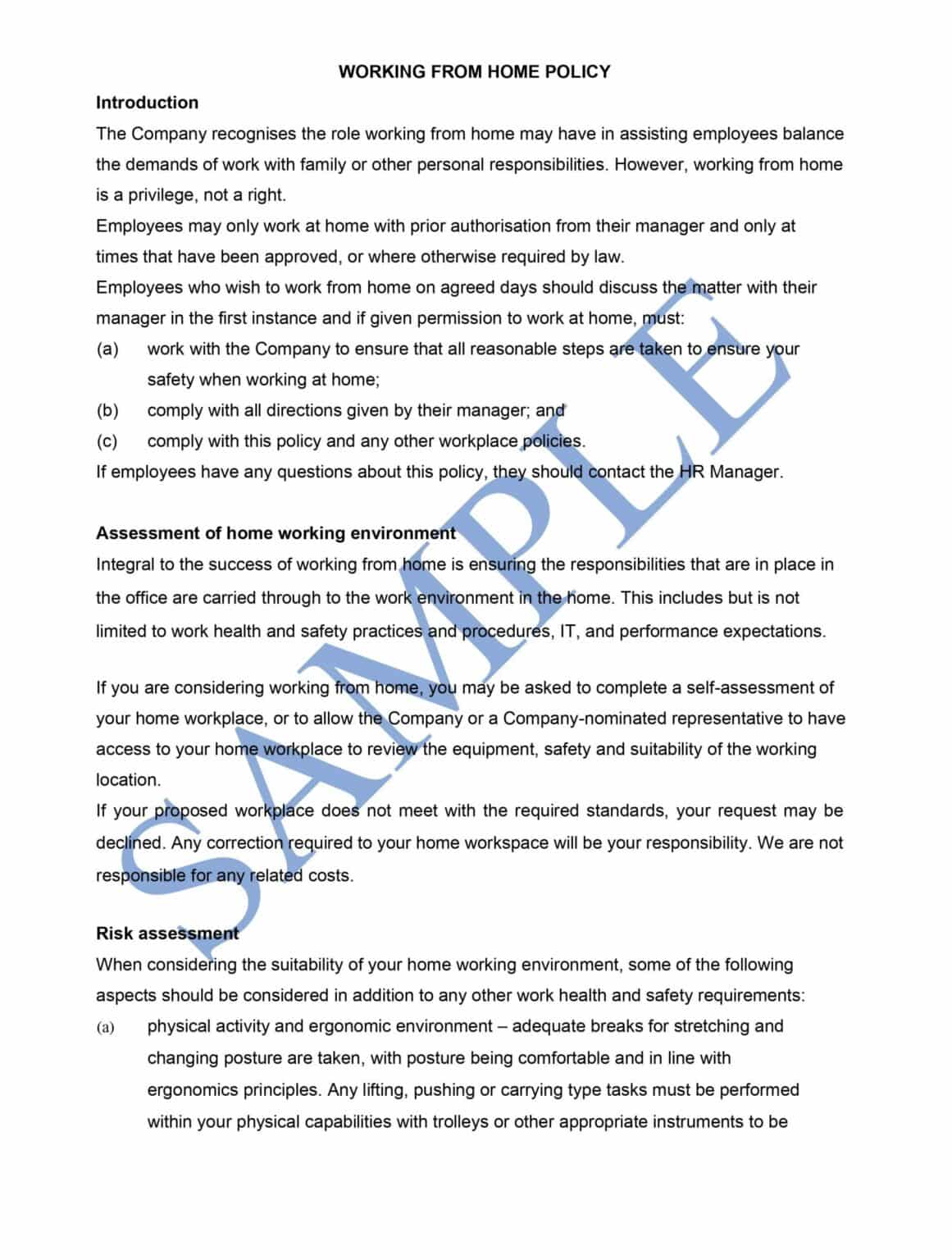

Burning questions about these common IT policies
What makes a good policy?
Any great IT policies will start with your business goals.
This is because it’s difficult to write up IT policies if your business is unsure why its policies are being created. So, figure out your business goals first and the rest will flow.
Do you want to protect your business information? Improve employee knowledge? Improve your business practices? Create an action plan?
All in all, you may have many goals or objectives, or only a few.
Whatever your objectives are, ensure they are at the forefront of your IT policies. It’s also a great practice to keep your goals in mind when you’re drafting your policies, as your objectives should always shine through.
I don’t have IT experience, how do I write up IT policies?
Surprisingly, you don’t need any IT experience to write up some great IT policies!
All you need is a good understanding of what IT resources your business uses. If you’ve got that then you can draft up any sort of IT policy.
However, if you’re unsure, need a hand or want to ensure your policy is strong from a legal perspective, our lawyers are always happy to help.
Arn’t IT policies only for businesses who have IT teams?
There seems to be a common misconception that a business only needs IT policies if it has a tech or IT team. But that couldn’t be further from the truth.
Even if your business isn’t into IT or doesn’t have an IT team, you’ll still need a few strong IT policies.
You see, your IT policies are there to inform all your employees on acceptable and non-acceptable behaviours when it comes to your IT resources or equipment.
Your IT policies also create a great structure for your business to follow to reduce and handle security or data breaches in a timely manner.
So, whether you have an IT team or not, your IT policies are there for your employees and overall business management.
There’s alot of common IT policies, do I really need more than one?
If you want comprehensive IT protection that’s easy to navigate, then the answer is — YES.
In general, whilst it is not impossible to have one overarching IT policy that covers a range of IT areas, there is one major downside — you’ll have one giant IT policy. This can be difficult to read, navigate and keep track of, for both yourself and your employees.
After all, no one wants to read 100+ pages worth of a policy just to find the section they are looking for. That’s counterproductive and can be reckless as things can easily get overlooked and lost within piles of pages.
So, it’s best to split up your IT objectives into separate IT policies. In particular, this ensures you’re optimising your businesses organisation levels and keeping things as clear as possible for your employees.
Can I fire an employee if they fail to abide by my IT policies?
This seems to be the golden question on many business owners’ minds.
In short, this is not a yes or no type of question.
In general, if there is a serious breach of your business IT policies, your IT policies are clear and well-drafted and all your employees have been made aware of your policies, then there may be grounds to terminate that employee.
Although, just because an employee breaks a policy rule, it does not automatically mean you’re entitled to terminate their employment. If the courts view the termination as harsh, unjust or unreasonable, your employee may have a claim for unfair dismissal against your business.
However, if you suspect an employee is breaching business policy, it’s best to contact an Employment Lawyer to seek tailored legal advice.
How we can help
If you’d like to implement some new IT policies or update your old ones, we are here to help. We’ve provided you with the most common IT policies small businesses should consider implementing. We’ve also provided you with a template for each, so you can hit the ground running. You can either click on the templates above or browse through our extensive legal document library of 300+ documents.
We have fantastic in-house lawyers to help you customise your policies to meet the needs of your business. Remember, your first policy is free!



